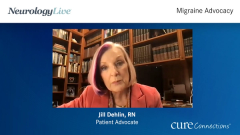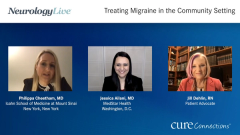
Diagnosing Patients With Migraine
Jessica Ailani, MD, describes her approach to evaluating new patients for migraine and explains how her diagnostic work-up can impact her recommendations for treatment.
Episodes in this series

Philippa Cheetham, MD: Let me ask you about the initial evaluation. A patient is sitting in front of you for the first time in your office. First of all, how do patients typically first present to you? Are they referred to you by their primary care provider? Are they self-referred? Are they coming from the emergency department? How do you initially evaluate a patient both clinically and in terms of the investigations you might do in that initial consultation?
Jessica Ailani, MD: Patients take all sorts of paths to see us. Some patients are referred to us by their primary care providers, and some patients come to us because a general neurologist has referred them. Many patients are self-referrals or patient referrals, or they had a family member or friend who has seen us. We have patients who are referred from ear, nose, and throat doctors, from the emergency department, from ophthalmology—basically the entire gamut of the medicine subspecialties have referred patients to us.
When new patients do come to see us, most of the time I find that there has been a critical event that has finally pushed them to seek a headache specialist. My entire goal for the visit is to first determine if the type of headache they are having is a primary headache disorder, meaning it is either migraine or tension type or cluster headache, a type of headache that is not caused by something else, like a brain tumor or abnormal blood flow. Then, the second goal I have is to figure out what that critical event was, what it is that got them so concerned that they came in. Then, I consider what the goals of their treatment are. Understanding the critical event really leads me to understand the patient’s treatment goals.
Most of our evaluation focuses on listening to the patient’s story. We also want to hear the story of the very first time they experienced any sort of headache. This is surprising to patients. They usually want to tell us about that critical event right away, and we want to pause them and say, “OK, I am definitely going to get to that, I want to hear that, but let’s start all the way back at the first time you ever had a headache.” The reason that is important is the patient’s history is the essential part of making the diagnosis for any headache disorder. In the conversation about their history, we want to hear what the headache is like, where it is located, what the pain feels like, what, if anything, triggers it, how long it lasts, if it is a short headache or a long headache, and if it lasts for seconds or hours. Is it a case where boom, here is the worst headache of your life, or does it gradually build up and then you are throwing up?
This history tells us a little bit about the nature and the type of headache a patient is experiencing. We also want to know what comes with the headache. Are you nauseous or are you vomiting? Do you have light or sound sensitivity? Do you crawl into bed, or would you prefer to crawl into bed if you could? Are you pacing? Are you banging your head on the wall? Is your eye tearing or drooping? Is everyone around you freaking out because you are agitated and you cannot control yourself? Did these headaches start in your 50s? Did they start in your 20s? Did these headaches start in your 20s, go away, and then come back again in your 40s? All of this history gives me key essential details of what is going on, but I only get to hear that if you start at the beginning and you move forward.
Philippa Cheetham, MD: When you talk about a critical event, are you talking about a stressor that results in a headache, or are you talking about a very severe attack that stands out as being much bigger and bolder than previous headache events? How do you define a critical attack?
Jessica Ailani, MD: I can tell, by listening to both of you, that your critical event was the time you went to the emergency department and were admitted with the worst headache of your life and found out you had migraine. Whereas for Jill, the critical event was when she transitioned into menopause and then went from having episodes of migraine to daily migraine events. These are very different stories. One event seems very gradual and quiet, while one is an in-your-face, very loud, serious event. Both of these were critical because they changed the nature of your relationship with headaches, and they therefore change how we are going to approach headaches for both of you. As the clinician, how I treat your headaches, tell you about your diagnosis, and what work-up I need to do completely depends on the story of that critical event.
As Jill mentioned, your horrible headache that came on suddenly—that one that brought you to your knees, when you ended up in the emergency department—required an evaluation for what is known as a thunder-clap headache. It feels like the worst headache of your life. Did you have a subarachnoid hemorrhage? There needed to be some imaging, like an MRI. Looking at the blood vessels, an MRA [magnetic resonance angiography] would be needed. Possibly, in the moment, a lumbar puncture to look for blood in the CSF [cerebrospinal fluid] is required. Did you have an aneurysm rupture; is that what caused it? When everything turned out OK and they delved a little more into the story, maybe at that time they decided you had migraine. Maybe it was a different kind of headache. Maybe you did have a thunder-clap headache and then eventually it turned into episodic migraine.
For Jill, she might have had a history of episodes of migraine, and then transitioned into menopause. In her case, I would have wanted to hear more about that transitional period. Did it slowly escalate and then, she does not remember when, but one day she realized the headache was every day? And in that period she was overusing acute over-the-counter medications and discovered that, “Oh, no, my stomach is hurting more, I have an ulcer because I’ve been using Excedrin?” We see this all the time. In that interval, her menses went from very regular and not bothersome to irregular. She could not predict what was going on, and that tells me there is a big hormonal component to what is going on here, and we have to pay attention to and investigate that. She does not necessarily need an MRI at the onset, but she might need some test of her hormones. Where is she in menopause at that time? Does she need some hormonal supplementation to help her with this? Is she getting hot flashes? Is she having memory changes at that time? Are there other signs that her estrogen is dropping suddenly and that needs to be addressed? That critical story is very different for every patient, and if you can get what that is, it leads you down a diagnostic path.
Philippa Cheetham, MD: Thank you for watching NeurologyLive® Cure Connections®. If you enjoyed the program, please subscribe to our e-newsletter to receive upcoming programs and other great content right in your inbox. Thank you so much.
Transcript Edited for Clarity
Newsletter
Keep your finger on the pulse of neurology—subscribe to NeurologyLive for expert interviews, new data, and breakthrough treatment updates.





























